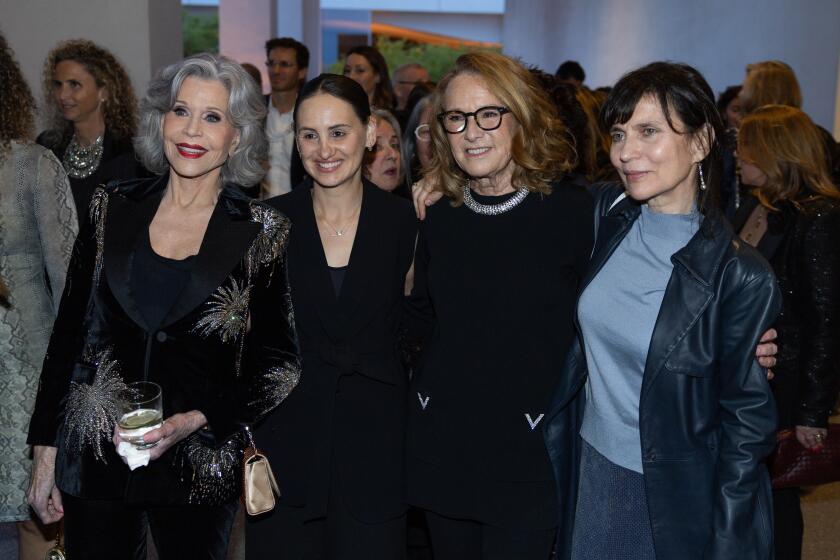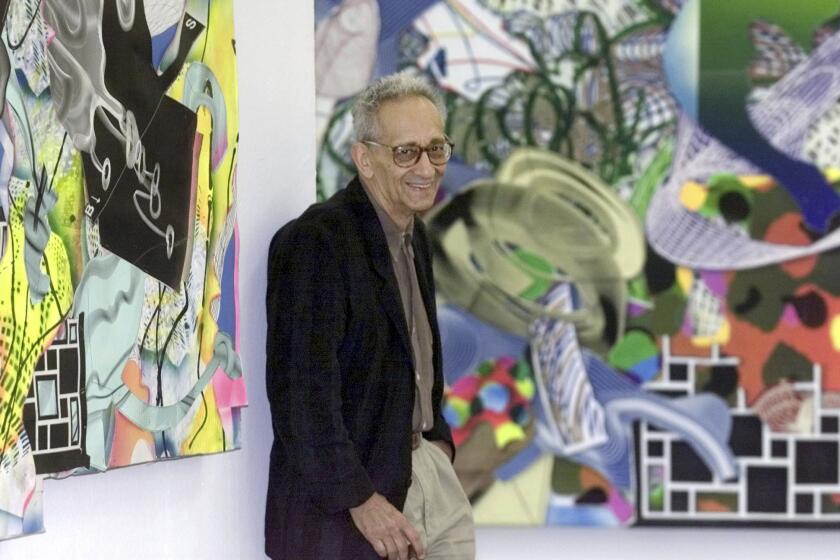Ethnic Discord : Armenian, Azerbaijani Youths Try to Play It Out : Moscow’s Basement Theater project serves as therapy for teen-agers scarred by the strife in Nagorno-Karabakh.
Yulia Sheveleva raised her slender arms in exasperation and belted out a panicky cry that rang across the stage, startling the amateur, teen-age actors.
“How do you expect to perform this play in two days in front of hundreds of people when you refuse to even talk to each other?” she asked the cast, Armenian and Azerbaijani youths rehearsing a Romeo-Juliet production set in their strife-torn hometown of Baku.
Silence. Eyes darted from one face to the other, until one actor grudgingly nudged a neighbor. Sheveleva heaved a sigh of relief; the group reassembled on stage.
It was just another day in the life of Moscow’s Basement Theater. The company has served as an ideological battleground, therapist’s couch and a home off the streets for teen-agers from across the former Soviet Union scarred by the trauma of ethnic and national conflicts.
“Hate, fear--it’s the same result everywhere,” explained Sheveleva. “Nagorno-Karabakh, Baku, Los Angeles, it doesn’t matter. I’m afraid my kids here would understand all too well why neighbors start shooting each other.”
For six years, Sheveleva, 31, has brought together teens from nationalities that are hostile toward each other to write and perform plays about the prejudices tearing apart their countries.
Later this year, she hopes to work with the Anti-Defamation League in a joint project that would bring American black, Hispanic and Jewish teen-agers to Russia to explore discrimination issues.
With her ready, warm laugh and boundless determination, Sheveleva is using her theater to help solve one of the bloodiest, most intractable problems in the former Soviet Union: ethnic conflict.
For decades, Soviet leaders denied that such conflicts existed, claiming their country was a land of “fraternal brotherhood” among its more than 100 different nationalities. That lie has now been exposed with a vengeance. The list of grievances between nationalities and ethnic groups in the former Soviet Union is endless, but in the end, the result is the same.
“A new generation of children is growing up in an atmosphere poisoned by fear and hostility between former neighbors,” the dark-eyed director explains.
Therein lies her mission as the founder of the Basement Theater. “We have to begin with children, because they are truly the only hope for changing society’s sickness,” Sheveleva says.
Her idea is simple: in the span of one week, she brings to her stage teen-agers from different ethnic and national backgrounds and engages them in what Sheveleva calls “theatrical psychotherapy.”
“The most important thing is to make these kids feel like they are somebody, that they are important in their own right. The old Soviet mentality drummed it into our heads that we were no one; that we could do nothing by ourselves as individuals.”
Under Sheveleva’s direction, the teen-agers’ task is to create and publicly perform a full-length play about the strife in their hometown. In seven tense days of traded accusations and outbursts, mistrust slowly melts into an honest exploration of why and how prejudices are formed.
Amir Tagiyev, one of Sheveleva’s young performers, knows the face of prejudice and hatred all too well for his 18 years. The half-Armenian, half-Azerbaijani refugee witnessed numerous atrocities in his hometown of Baku during the January, 1990, pogroms, in which scores of Armenian residents were killed by Azerbaijanis.
Tagiyev escaped with his mother and sister to Moscow, where he met Sheveleva last year as she was assembling a cast for a play about the Baku tragedy.
He speaks in quiet, emotion-laden tones about the week he spent holed-up in a hotel room rehearsing with Sheveleva and a group of Armenian and Azerbaijani teen-agers assembled from Baku.
“It was . . . powerful,” he says choking off the tears. “Every word, every line we spoke was a battle. No one wanted to listen to each other, no one would shut up. We couldn’t agree on what happened to our hometown, but we all felt, I think, that something was killed inside of us.”
That performance was one of the most difficult of all Sheveleva’s ambitious endeavors. Two hours before the curtain was to rise on a downtown stage in Moscow, the Azerbaijani cast pulled out, leaving the Armenian performers--and Sheveleva--stranded. “I can’t even describe what I felt then,” she says now, several months later. “It was something between disbelief, anger and panic all at the same time.”
Sheveleva frantically divided her Armenian cast in half, with the result that the Azerbaijanis in the play were actually portrayed by Armenians, themselves refugees from the pogroms carried out against them in Baku. The performance went on as scheduled and the cast received a standing ovation from the crowd.
After the show, Sheveleva accompanied the young Armenian actors to the Azerbaijani Consulate in Moscow, where they gave flowers to their fellow cast members who were watched over by adult chaperons in the government building.
Tagiyev remembers how his would-have-been Azerbaijani co-star congratulated him on playing his role in absentia. “I had become friends with him, despite everything,” Tagiyev said. “He was absolutely sincere when he congratulated me. I will remember that for a long time.”
Moments like those make it all worthwhile for Sheveleva, who has traveled a long and solitary road in her efforts to make the Basement Theater’s work a reality. This young director has alternately been called “naive,” a “provocateur” or a “KGB agent” by unsympathetic Russian citizens unwilling to have their country’s “secret” of ethnic strife exposed on stage.
While her productions now attract more supportive audiences, Sheveleva still has to cajole bureaucrats as well as raise all the funds for the theater herself.
Sheveleva first began to see the theater as a stage for conflict resolution in 1986 while working with Peace Child, an American nonprofit organization that produced joint U.S.-Soviet children’s theater. The Cold War seemed far from over then, but Sheveleva believed that something should be done to lessen the fear and hostility that gripped both superpowers.
Abandoning her profession as a singer, she started the first Russian branch of Peace Child with help from Steve Rifkin, the organization’s American representative and a native of San Rafael, Calif.
It was during her work with Peace Child that Sheveleva got the idea of producing plays between hostile nationality groups in her own country. She has since worked with children from nearly every republic of the former Soviet Union, as well as with teen-agers who encounter social prejudices because of afflictions, including deaf teen-agers and those who have cerebral palsy.
Her first production was staged in Vilnius, Lithuania, in August, 1990, with a cast of Polish, Lithuanian and Russian teen-agers who depicted the tensions between minorities in that small Baltic republic. Then came the Soviet crackdown in January, 1991, in Vilnius, and with it, a personal tragedy for the cast: the father of one of the performers was killed in the unrest.
That tragedy served to strengthen the commitment she and her acting company felt for using the stage as an arena for conflict resolution. “When it works, when a Lithuanian kid hugs a Russian, or an Armenian shares a joke with an Azerbaijani, it’s just an unbelievable feeling,” she exclaims. Despite the seriousness, and at times the hopelessness of the issues they depict on stage, Sheveleva’s teen-age cast says the theater gives them a sense of purpose and camaraderie during these times of rapid change in Russia.
Tagiyev, the Azerbaijani-Armenian actor, puts it very simply: “It’s now my home . . . in every way.” Given his experience, does he have any hope that the Basement Theater’s work has changed anything?
“In the future, if even half of us stop to think before we start shooting at each other, well, then that’s the most we can hope for. That would be great.”
More to Read
The biggest entertainment stories
Get our big stories about Hollywood, film, television, music, arts, culture and more right in your inbox as soon as they publish.
You may occasionally receive promotional content from the Los Angeles Times.






